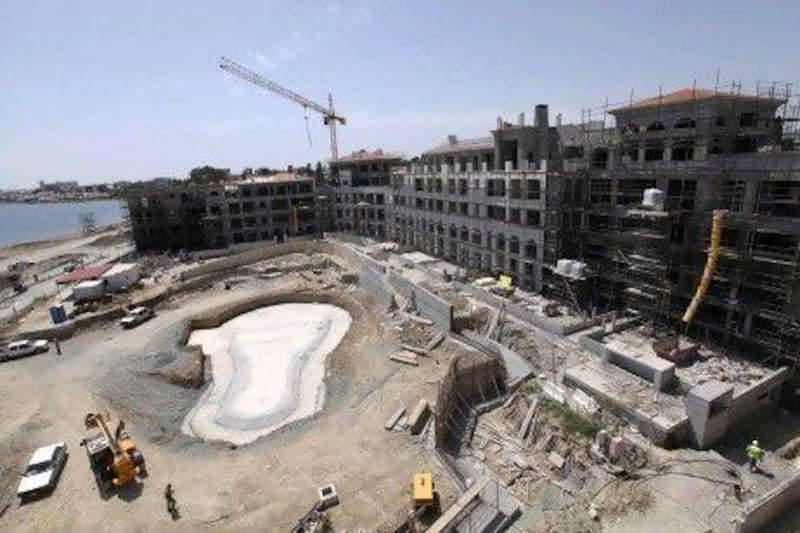LIMASSOL // Bronzed Russian tourists roast on the beaches of Limassol, a Cypriot resort where many wealthy compatriots running offshore businesses have pumped countless millions into prime real estate.
"Limassolgrad", as the city is dubbed, is home to Russian schools, restaurants, beauty parlours and a large Russian Orthodox church.
There are even fur coat boutiques doing brisk business despite the sweltering 35°C heat.
Long-standing economic and diplomatic ties bind Russia, a global power with a population of 141 million, and Cyprus, a small and divided but strategically located Mediterranean island of fewer than a million people.
That quirky relationship is now set to become even closer.
Moscow said last week that cash-strapped Cyprus had requested a €5 billion (Dh22bn) rescue loan, primarily to shore up its oversized banking sector that has been battered by heavy exposure to Greece's economic meltdown.
That request has caused unease in Brussels, raising questions over the allegiances of Cyprus, which assumed the European Union's rotating presidency this month.
Days earlier, Cyprus also solicited help from the EU's firewall funds.
Until now, Cyprus has not said how much it needs in total, but local media speculate the figure could be about €10bn, more than half its €17.3bn GDP.
President Demetris Christofias, the EU's only communist leader, insists there is nothing wrong in tapping Brussels and Moscow simultaneously for an economic lifeline.
"Let's hope we can manage both," he said last week. But Kremlin gold, he argued, will have no strings attached, while EU aid could come with "harsh" conditions, like the austerity measures foisted on Greece, Ireland and Portugal.
"The Russians, as good friends of Cyprus, want to take care of us," he proclaimed. "We are grateful to the Russian Federation for their ongoing and absolute support without anything in exchange."
Mr Christofias has also put out feelers to China for a loan.
A European diplomat quipped in response: "The only free cheese is to be found in a mousetrap."
Many Cypriots are also concerned. "Being viewed as Russia's satellite is a very high price to pay for avoiding unpopular [austerity] measures," the Cyprus Mail said in a recent editorial.
Cyprus's conservative opposition agrees with Brussels that Nicosia must reform its pension system and bloated public sector to make the country's predominantly capitalist and historically resilient economy competitive again.
Russia loaned Cyprus €2.5bn last year, with no EU-style demands for economic reform.
If Moscow follows through on the latest request, Cyprus will then be beholden to Russia for an amount equivalent to nearly half its GDP.
Mr Christofias, 65, studied in Soviet-era Moscow and once lightheartedly described himself as "the red sheep" of Europe.
He has played down concerns about any influence Moscow could gain by making such loans.
He assured his European partners last week "the Russia of today is not the Soviet Union of the past" and that Moscow has embraced capitalism.
There has been speculation that in return for financial support, Moscow could demand a stake in Cyprus's recently discovered offshore gasfields that Brussels hoped would help break Europe's energy dependence on Russia.
Cyprus insists a Russian loan will not influence the bidding process to develop its gas riches but Nicosia has not ruled out Russian participation in an €8 to €10bn natural gas terminal Cyprus is planning to build.
Others see a more immediate incentive for Russia to come to Cyprus's aid.
"Cyprus serves as a very useful tax haven for a considerable part of the Russian wealthy elite and they want to keep it that way," said Hubert Faustmann, a political analyst at the University of Nicosia.
At 10 per cent, Cyprus has the EU's lowest corporate tax rate, which Nicosia insists must survive any meddling by the bloc.
On paper, Cyprus is one of the largest investors in Russia worldwide, accounting for 20 per cent of its foreign direct investment last year, more than China.
Most of this money invested in Russia through Cyprus is Russian cash being repatriated.
Politically, Moscow has been a staunch ally. At the UN Security Council, where Russia is a permanent member, it has consistently supported the Greek Cypriots, who represent the island internationally.
Economic ties, meanwhile, date back decades to when Cyprus swapped wine in bulk with the Soviet Union in return for tractors.
In the early 1990s, large numbers of Russian businessmen arrived in Cyprus after the collapse of communism.
Russian tourists are big business. In 2010, an estimated 234,000 Russians visited.
That figure soared by 50 per cent the following year and even more are expected this year. Only Britain, the island's former colonial master, provides more holidaymakers. But Russian tourists spend more and, according to hospitality workers, are bigger tippers than the British and less fussy than Germans.






